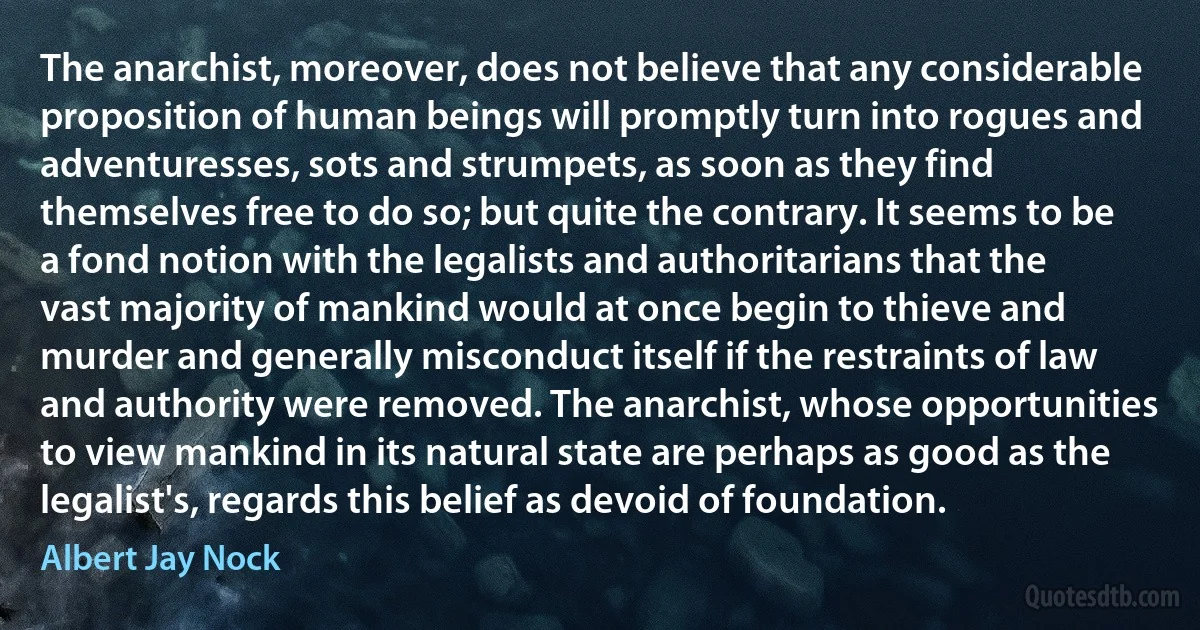
The anarchist, moreover, does not believe that any considerable proposition of human beings will promptly turn into rogues and adventuresses, sots and strumpets, as soon as they find themselves free to do so; but quite the contrary. It seems to be a fond notion with the legalists and authoritarians that the vast majority of mankind would at once begin to thieve and murder and generally misconduct itself if the restraints of law and authority were removed. The anarchist, whose opportunities to view mankind in its natural state are perhaps as good as the legalist's, regards this belief as devoid of foundation.
Albert Jay NockRelated topics
anarchist authority begin believe find fond free good human law misconduct natural once perhaps quite state turn vast viewRelated quotes
"True science has no belief," says Dr. Fenwick, in Bulwer-Lytton's Strange Story; "true science knows but three states of mind: denial, conviction, and the vast interval between the two, which is not belief, but the suspension of judgment." Such, perhaps, was true science in Dr. Fenwick's days. But the true science of our modern times proceeds otherwise; it either denies point-blank, without any preliminary investigation, or sits in the interim, between denial and conviction, and, dictionary in hand, invents new Graeco-Latin appellations for non-existing kinds of hysteria!

Helena Petrovna Blavatsky
Society, with all its prisons and bayonets and whips and ostracisms and starvations, is powerless in the face of the Anarchist who is prepared to sacrifice his own life in the battle with it. Our natural safety from the cheap and devastating explosives which every Russian student can make ... lies in the fact that brave and resolute men, when they are rascals, will not risk their skins for the good of humanity, and, when they are sympathetic enough to care for humanity, abhor murder, and never commit it until their consciences are outraged beyond endurance. The remedy is, then, simply not to outrage their consciences.

George Bernard Shaw
We have, indeed, in the part taken by many scientific men in this controversy of "Law versus Miracle," a good illustration of the tenacious vitality of superstitions. Ask one of our leading geologists or physiologists whether he believes in the Mosaic account of the creation, and he will take the question as next to an insult. Either he rejects the narrative entirely, or understands it in some vague non-natural sense. ...Whence ...this notion of "special creations"...Why, after rejecting all the rest of the story, he should strenuously defend this last remnant of it, as though he had received it on valid authority, he would be puzzled to say.

Herbert Spencer
There is a lot of talk amongst Bush's opponents that we should turn this war over to the United Nations. Why should the other countries of this world, countries who tried to talk us out of this folly, now have to clean up our mess? I oppose the U. N. or anyone else risking the lives of their citizens to extract us from our debacle. I'm sorry, but the majority of Americans supported this war once it began and, sadly, that majority must now sacrifice their children until enough blood has been let that maybe - just maybe - God and the Iraqi people will forgive us in the end.

Michael Moore
The KGB, in Kalugin's view, was more successful than the CIA, partly because of its skill in exploiting the corruption which became endemic under Indira Gandhi's regime. As Inder Malhotra noted, though corruption was not new in India: People expected Indira Gandhi's party, committed to bringing socialism to the country, to be more honest and cleaner than the old undivided Congress. But this turned out to be a vain hope. On the contrary, compared with the amassing of wealth by some of her close associates, the misdeeds of the discarded Syndicate leaders, once looked upon as godfathers of corrupt Congressmen, began to appear trivial.

Indira Gandhi
